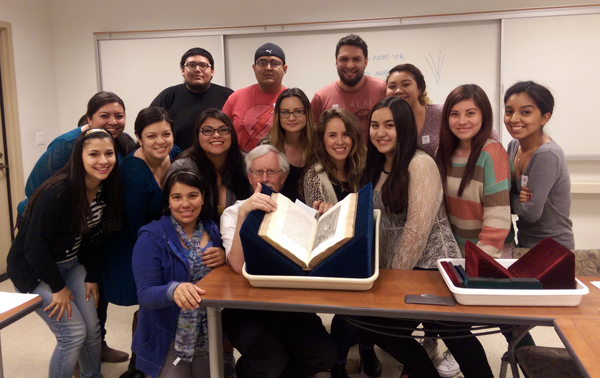Spanish Students Unravel the Mysteries of Early Modern Book Production in a Visit to the Huntington Library

February 20, 2015. The Huntington Library opened its doors to students of Spanish 454, Early Modern Spanish Literature on February 20. In a one-hour and a half session Spanish masterpieces circulated around the room as students were able to connect what they had learned in class with the actual early modern editions of the texts.
Assistant professor Marta Albalá Pelegrín (Cal Poly Pomona), curator Stephen Tabor (Huntington Library) and PhD Student Javier Patiño Loira (Princeton University) unraveled the mysteries bounded in texts, from the nickname of Cervantes's translator, Mabbe, or Don Diego Puede Ser (a derivation of May-be), to the ownership history of texts (and thus the ex-libris and signature of one of the major literary historians of Spanish Literature, Menéndez Pidal, hidden underneath the cover of María de Zayas's novels).
From the first edition to the poems of Garcilaso de la Vega, María de Zayas's novels or Cervantes's short stories, students handled, and analyzed early modern printed texts. By the end of the session they were able to tell whether a book belonged to a nobleman or a man of letters, whether it was used for public or private reading. Raised hands declared if a book was a quarto, a folio, and was from the 16th or the 18th century. Exquisite golden French bindings, marble paper decorations and worm bites made them wonder as well as discover the marvels of the literary archive and literary objects.
Student Jesus Bautista declared that "this visit helped him to better connect what he was studying in the course with its actual materiality, allowing him a greater understanding of the class"; Tania Núñez stated that this visit "allowed [her] not only to have a broader vision of the contents covered in the class, but also a vision of what could have been to live on the Early Modern period. Thus, inexplicably feeling the transition and transformation that accompanies different epochs, manners and daily routines".
